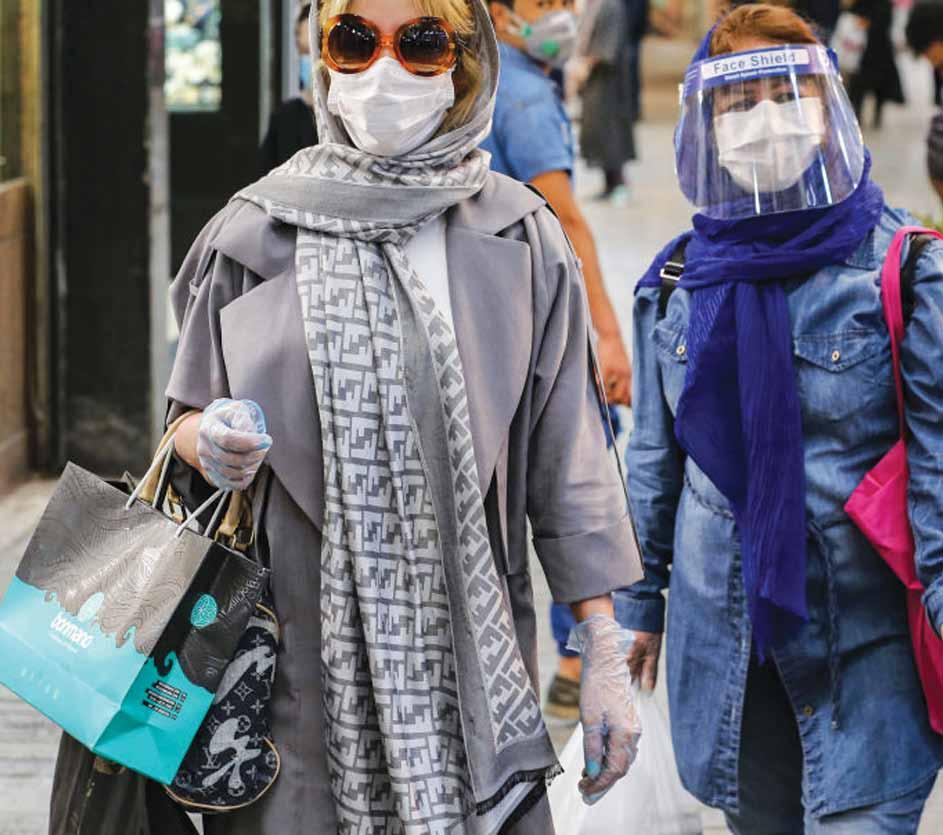
3 minute read
Issue 1798- May - 01/05/2020
olitics P
US Tightens Binds of Containment on Iran as Virus Rages
Shoppers clad in protective gear, including face masks and shields and latex gloves, due to the COVID19- coronavirus pandemic, walk through the Tajrish Bazaar in Iran’s capital Tehran on April 2020 ,25 during the Muslim holy month of Ramadan. (Getty)
by Joseph Braude Over the last week, Washington has turned its eye once more to tightening the binds of containment, in response to Iranian provocations in the Gulf, moving to extend a UN arms embargo and deliver a sharp warning to Iranian naval commanders. Owing to the depredations of the coronavirus, Tehran’s options for counter-escalating remain limited. The Iranian government appears consumed with the complications of gradually re-opening sickened cities and the consequent depletion of its treasury. AMID CORONAVIRUS, U.S. ADMINISTRATION TIGHETENS CONTAINMENT On April 15, when Iranian gunboats approached within 50 yards of two American vessels practicing coordinated operations in the Gulf, U.S. President Trump tweeted, “I have instructed the United States Navy to shoot down and destroy any and all Iranian gunboats if they harass our ships at sea.” Asked for commentary, Secretary of Defense Mark Esper refused to divulge details, but confirmed the administration’s posture: “I’m not going to get into the exact tactics, but they need to be well-warned, the Iranians, that we are not going to tolerate that behavior.” The President’s declaration, in the view of some outside experts, sends a signal to Tehran that American military capabilities will not necessarily be bound by the logic of “strategic patience” espoused by the last administration. “These exercises show U.S. forces can go on the offensive against Iranian small boats, rather than simply defending against them,” said Bryan Clark, a naval analyst for the Hudson Institute who formerly served as special assistant to the chief of naval operations. In previous years, the U.S. Navy’s tactical doctrine hinged on “deck guns and onboard helicopters, which can be overwhelmed by a large boat swarm.” In another line of effort, reports emerged that U.S. Secretary of State Mike Pompeo is drafting a legal argument, based on the text of UN Security Council Resolution 2231, that would give the U.S. standing at the Security Council to call for an extension of the arms embargo on Iran, currently slated to expire in October, as well as re-impose sanctions for Iranian violations of the JCPOA. As Pompeo told the paper, “We cannot allow the Islamic Republic of Iran to purchase conventional weapons in six months. President Obama should never have agreed to end the U.N. arms embargo.” He added, “We are prepared to exercise all of our diplomatic options to ensure the arms embargo stays in place at the U.N. Security Council.” CORONAVIRUS CIRCUMSCRIBES IRANIAN OPTIONS Despite efforts by Iran’s President and Supreme Leader to put the coronavirus in the rearview mirror, Iran’s Deputy Health Minister Iraj Harirchi said on Monday that a partial lifting of COVID-19-related restrictions on social and economic life does not mean “going back to normal,” and public health officials would re-impose those restrictions if the country witnesses a renewed spike in the number of infections and deaths. Since April 12, Iran began easing its lockdown, permitting designated factories, businesses, and other public spaces to re-open, despite widespread concerns about rebound. According to Health Ministry officials, some 60 Iranian cities, including most of the nation’s provincial capitals, remain in critical condition and continue to register high numbers of new infections and deaths. Iran’s options for countering Washington and its allies have been significantly hampered by the economic fallout from the pandemic. According to Tehran City Councillor Mohammad Javad Haqshenas, 40-45 percent of Tehran city residents are now living under the poverty line and in dire need of imminent financial support from the government. At the same time, the collapse of the oil market and much of ordinary economic activity have translated into a sharp decline in the Iranian government’s tax and oil revenues, placing a low ceiling on the levels of financial assistance Tehran can credibly offer to people in need. As if to underscore the government’s newfound austerity, on Sunday President Rouhani called on the wealthy to donate food and money to those in need: “We must all help not to let anybody’s table remain without iftar.” 40-45 percent of Tehran city residents are now living under the poverty line and in dire need of imminent financial support from the government





